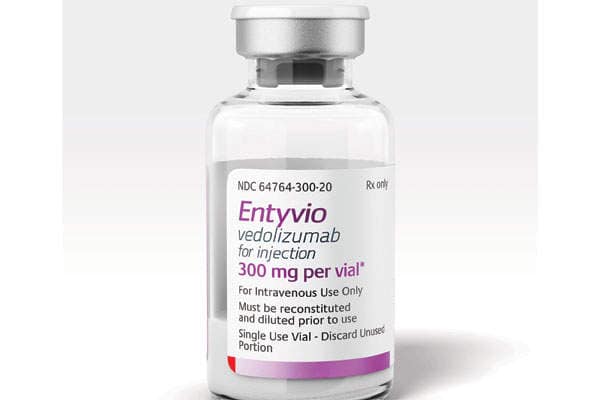
Takeda has new clinical data on a subcutaneous formulation of its Entyvio drug in Crohn’s disease, expanding the potential of the drug beyond ulcerative colitis.
Top-line results from the VISIBLE 2 trial show the new formulation is effective at keeping Crohn’s disease patients in remission after symptoms have been cleared using two doses of the intravenous version of Entyvio (vedolizumab).
Maintenance therapy with subcutaneous vedolizumab, given every two weeks, kept more people in clinical remission than placebo over the course of the 52-week study, according to the Japanese drugmaker.
Entyvio is an important growth product for Takeda as it is bearing the brunt of losing patent protection in the US for its big-selling multiple myeloma drug Velcade (bortezomib), and is now its biggest brand. It is emerging as the dominant antibody therapy for ulcerative colitis after outperforming AbbVie’s TNF blocker Humira (adalimumab) in a head-to-head trial.
The IV formulation of Entyvio is approved for moderate-to-severe ulcerative colitis and Crohn’s, and GlobalData has already suggested that having two formulations of the drug will allow Takeda to compete strongly against well-established ulcerative colitis drugs such as Humira and Johnson & Johnson’s Simponi (golimumab).
The GlobalData analysts think that ulcerative colitis alone would be a $1bn market opportunity for the pairing, and approval in Crohn’s as well would add significant upside to the franchise. Takeda has already filed the new formulation for ulcerative colitis in the US and Europe
Entyvio is already doing spectacularly well, growing 35% to 270bn yen ($2.5bn) with Takeda attributing its growth to increased use in patients who have never been treated before with a biologic drug.
“Meeting the primary endpoint of the VISIBLE 2 study marks a crucial step in our efforts to help patients with Crohn’s disease as to how they may receive treatment with vedolizumab, whether that is intravenously or subcutaneously,” said Asit Parikh, who heads Takeda’s gastroenterology business unit.
“These data, alongside the pivotal VISIBLE 1 results in ulcerative colitis, provide a more comprehensive picture of the new investigational subcutaneous formulation of vedolizumab as maintenance therapy for both ulcerative colitis and Crohn’s disease,” he added.
Patent expiries and a weak near-term pipeline were the main drivers for Takeda’s $63bn takeover of Shire, which completed in January.




